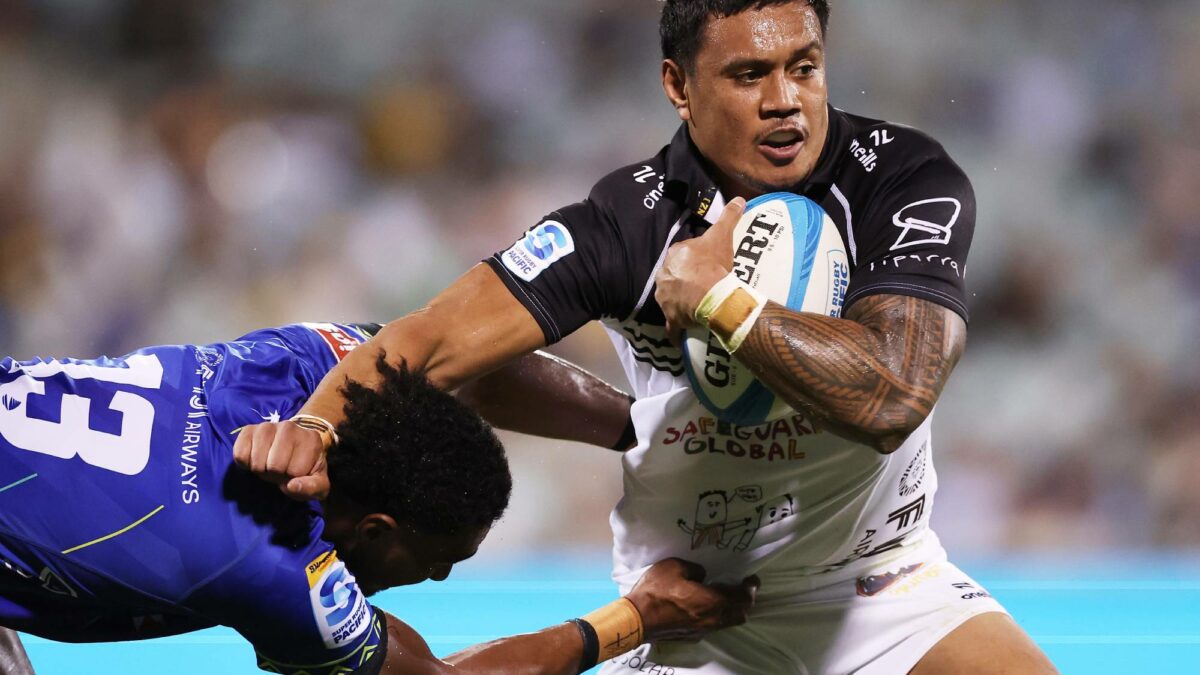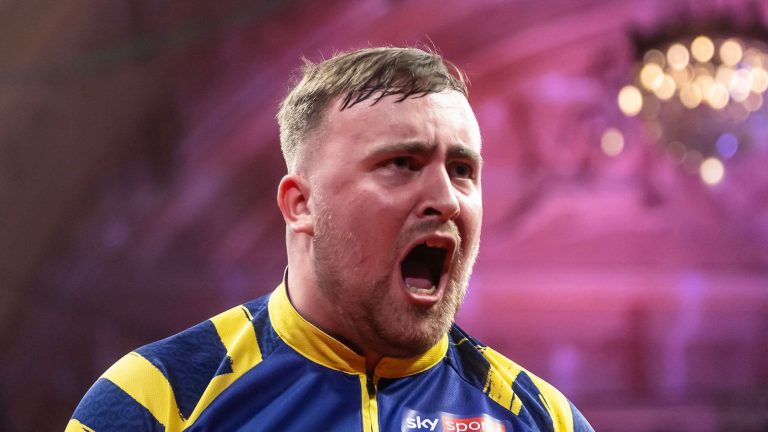With Super Rugby Pacific continuing to enjoy its most competitive season, it is fraught with danger to be drawing hard conclusions at the halfway point.
But seven matches in (eight for the Force), it feels like there’s enough exposed form to align performance and ladder position with early expectations, and to extrapolate that into which sides might be playing finals footy and which won’t.
At the pointy end, the Chiefs, Crusaders and Reds look certain finalists; not just because they currently make up the top three, but because they’re the sides mostly playing like a top three side should.
At the other end of the scale, I think it’s safe to discard the Drua (who despite having four home games left, have now lost twice on their own patch), and the Highlanders, who aren’t a bad side, but who on the weekend achieved the rare feat for a New Zealand franchise of losing to all Australian sides in the one season.
Rudimentary maths suggests that leaves six sides scrapping over three finals spots – the Force, Brumbies and Waratahs from one side of the Tasman, and the Hurricanes, Blues and Moana Pasifika from the other.
On what they’ve shown so far, the Brumbies, Moana Pasifika and the Hurricanes appeal, but it’s not as simple as that. The nature of the competition – teams effectively split into two conferences – means that not all schedules are equal, with teams from the ‘New Zealand conference’ matching up twice, taking points off each other in the process.

Hoskins Sotutu of the Blues is tackled (Photo by Phil Walter/Getty Images)
That’s not a criticism by the way; nobody is suggesting squeezing in two full ‘home and away’ rounds, and one of the reasons why this year’s competition has been so well received is through clever manipulation of the fixture, designed to avoid or put off some of the early season blowouts which have disengaged supporters in the past.
Judgment day however, is something that can’t be avoided forever, with the Waratahs, after two difficult weeks, now getting a sense of where they really sit in the scheme of things.
After a bye next week, the Force are soon to get their turn under the blowtorch – they’re an improved side, but the Hurricanes (home) then the Chiefs and Blues (both away), transports them into a different league.
Far be it for me to spoil the positive vibe around their 29-20 win over the Highlanders on Saturday, but despite currently sitting fourth, I don’t see the Force holding in the top six; ditto the sixth-placed Waratahs. Which would leave four teams in the race for three spots.
Round 4 success in Auckland means that the Brumbies have already done much of the hard work. Win the matches they’re expected to win at home, and that will be enough to secure them a spot.
Much of the positivity surrounding Super Rugby this year centres on the apparent ‘closing of the gap’ between New Zealand and Australian franchises. I’d suggest instead that the big story is actually the ascendancy of Moana Pasifika.
Wins against the Hurricanes and Crusaders and four scores over 40 points speaks to a huge lift in quality and self-belief, but the simple truth is, they need more of the same, or else it will all come to nothing.
Two of Moana Pasifika’s remaining matches are against the Blues. Whoever snares both of those will be well set for the finals. If the matches are split, then the dogfight involving those two sides and the Hurricanes will go down to the final week.
Another benefit of such a tight, compressed competition is that, while home-ground advantage in the finals is always beneficial and important, finals this season will all be bonafide contests, with every qualifier capable of winning.
But let’s not get too far ahead of things. This was the round where teams had to figure out if they were ‘dice-rolling risk-takers’ kicking for the corner, or ‘white bread, missionary position’ traditionalists knocking over the easy three. All while fans angrily pointed fingers at the decision makers who chose the ‘wrong’ option.
Yet to attempt a penalty kick all year, the Reds definitely fall into the first category, and on a wet night in Hamilton there was widespread criticism of Tate McDermott, for turning down a gift three points early in the second half in a vain attempt to secure a try.
The sliding doors nature of any sporting contest means that conclusions are impossible to draw.
With Harry McLaughlin-Phillips just failing to finishing off a superb scything run, before the Chiefs gradually won the field position battle and pulled away to a 27-15 win, I’m not sure how anyone can be certain those three points spurned would have made a difference.
There’s also the matter of the Reds’ opening try, scored from a rolling maul after a kickable penalty was instead nudged to the corner. Should that have been three points instead?
And have the ‘Hindsight Harrys’ already forgotten the Reds’ narrow wins this season, where a more conservative approach to kick for goal would likely have left them short?

Harry McLaughlin-Phillips of the Queensland Reds is tackled (Photo by Michael Bradley/Getty Images)
One thing we do know is that the Reds, Force and Brumbies lead the competition in the number of tries scored from set piece – all well over 70 per cent. The fast-paced nature of play and the stress placed on fatigued defences means that all sides know they are going concede points at the other end.
In that context, the emphasis placed by Les Kiss and other coaches to try to maximise red-zone conversion when it is ‘their turn’ on attack, is hardly a surprise. They’ve looked at the numbers and chosen the way they want to play.
On the positive side, the Reds got their lineout back on track and got great value from Harry Wilson’s ball carry and solid defence; albeit his opposite Luke Jacobson was equally convincing for the winners.
Saturday’s four-match marathon began with the Waratahs taking advantage of Moana Pasifika’s inability to mount any pressure – failing to tap an attacking penalty was a particular lowlight – to take a well-deserved 21-7 lead into half-time.
The home side needed to get their set piece right and confidence levels up, and when things eventually clicked, the Waratahs were rendered utterly powerless – swamped by six second-half tries, and a final score of 45-28.
Such was the swell of momentum, replacement Jackson Garden-Bachop enjoyed two career highlights a minute apart, while the final try to Samesi Tupou Tanieloa – strolling around the back of a lineout through woeful defence – really summed up how far the Waratahs had sunk in 40 minutes.

Teddy Wilson of the NSW Waratahs passes (Photo by Hagen Hopkins/Getty Images)
This feels like a good time to again remind Waratahs fans that a bottom tier team from last year, comprising new personnel on field and off, needs time to develop. And to point out – particularly for people who haven’t seen them play over the last fortnight – just how brilliant this Moana Pasifika team is when Ardie Savea gets his legs pumping and their running and support play kicks in.
Seeking their first win in Fiji, the Crusaders got things right in their 31-14 win – building an early lead before defending with heart as the humidity and a charging Drua came at them in the second half.
This was the best and worst of the Drua – almost unstoppable as the game loosened up, but far too impatient and error prone under a more structured, set-piece game. They did provide the weekend’s individual highlight however; a thrilling 70m run back and try from replacement Etonia Waqa.
Less flamboyant, but equally skilful, was the situational awareness shown by Will Jordan, who, under extreme advancing pressure, earned the plaudits of referee Ben O’Keeffe for the way he timed a put-down so as not to concede a 5m scrum.
And, in light of the debate around whether to attempt penalty goals or not, how about Chay Fihaki just shaving the upright – and clearing the dead ball line with ease – with a 64m attempt? Was this South Africa’s high veldt or sea level in Suva?
The Blues stayed in contention with a tense 19-18 win over the Hurricanes, in a match where it felt like, for long periods, both sides were playing in a straitjacket.
One player who did manage to stamp his personality was Beauden Barrett, relishing contact and who – often criticised for his kicking game – seemed to have the ball on a string at times.
Desperate for a win at all costs, and still unable to figure out a way to bring Mark Telea and Caleb Clarke into the play as running wingers, the Blues came down on the side of taking every penalty shot on offer, but more telling was the post-match reaction of Hurricanes coach Clark Laidlaw, appearing to be more reflective and less convinced about his captain’s decision to mirror the Blues in shooting for goal.
To close this matter off, Laidlaw’s ‘damned if you do, damned if you don’t’ summation illustrates how this is an issue way more nuanced and fraught than simplistic reactions would have us believe.
So, to Perth where the Highlanders were good for their early 20-7 lead, until their leaky maul defence and an ill-advised decision to try to spin bad ball from well behind the advantage line, right on half-time, saw things trimmed to 20-19.
With the Force firing after the break, Sean Withy’s reckless, red-card slide into Harry Potter only consigned the visitors into long periods on defence, and futile attempts to try to run the ball out from their own 22.
In the end, 29-22 represented a solid, comfortable win for the Force, and while they are far from a one-man show, Carlo Tizzano’s contribution in attack and defence, cannot have gone unnoticed by the current, or prospective, Wallabies’ coach.
Who may or may not be coach of a side who don’t like to take penalty kicks for goal…






